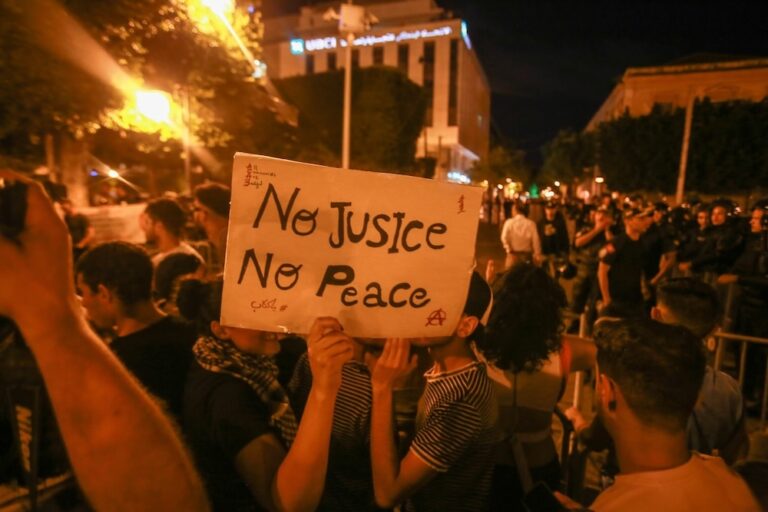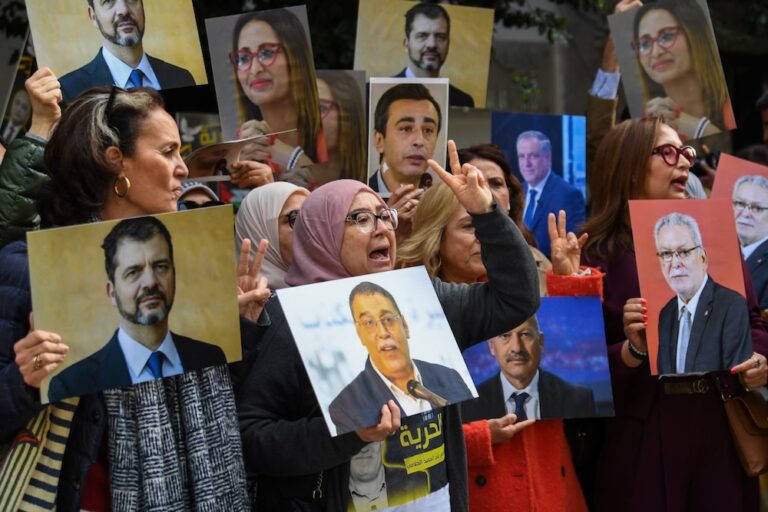On 9 September 2013, an investigative judge ordered the detention of Walid Zarrouk, a union leader, for a Facebook post criticizing the politicization of prosecutions. The same day, in separate cases, prosecutors summoned two journalists, Zouhaer al-Jiss and Zied al-Heni, accused of defaming public officials.
Tunisian authorities should quash the detention of a prominent activist and the prosecutions of two journalists for expressing their opinions, Human Rights Watch said today. They are accused of defaming public officials.
On September 9, 2013, an investigative judge ordered the detention of Walid Zarrouk, a union leader, for a Facebook post criticizing the politicization of prosecutions. The same day, in separate cases, prosecutors summoned Zouhaer al-Jiss, a journalist, for moderating a radio program in which a guest criticized Tunisia’s president, and Zied al-Heni, a journalist who had criticized the arrest of a cameraman for filming an egg-throwing attack on the culture minister.
“Judicial authorities are resorting again and again to the same articles in the penal code as a repressive tool against free speech,” said Joe Stork, acting Middle East and North Africa director at Human Rights Watch. “Instead of trying to silence critics, the government should look into their allegations, and fix the laws from the old repressive government that criminalize criticism of public figures.”
The UN Human Rights Committee has said that it is essential not to subject comment on public issues to censorship or restraint, that all public figures are legitimately subject to public criticism, and that there should be no prohibition on criticism of public institutions. Further, defamation should in principle be treated as a civil, not a criminal, issue and never punished with a prison term.
On September 1, Zarrouk, a former police officer and president of the Union for a Republican Police, wrote a Facebook post criticizing the general prosecutor of the Tunis Tribunal, Tarek Chkioua, alleging that his prosecutorial policy was “politicized.” Zarrouk wrote that Chkioua was violating “the rule of law, supremacy of the values of truth, justice, and equity and equality between citizens,” and alleged that Chkioua had served as the “judicial strong-arm of repression” under the former Tunisian dictator, Zine al-Abidine Ben Ali.
Zarrouk also criticized Noureddine Bhiri, the former justice minister, for reappointing Chkioua. The Facebook post included personal attacks against Bhiri and Chkioua.
The investigative judge of the fourth bureau of the First Instance Tribunal of Tunis charged Zarrouk on September 9 with “accusing, without proof, a public agent of violating the law” and “defamation of public officials” under penal code articles 128 and 245; distributing information “likely to harm public order” under press code article 54; and “disrupting lives through public communication networks” under article 86 of the telecommunication law, his lawyer, Charfeddine Kellil, told Human Rights Watch.
On September 9, al-Jiss, a journalist at Express FM radio, received a summons to appear as an accused before the investigative judge of the 14th Bureau of the Tunis Tribunal. Al-Jiss told Human Rights Watch that the complaint was filed in the name of President Moncef Marzouki and referred to a radio program that al-Jiss had moderated on March 9. He told Human Rights Watch:
In the course of this radio program, I interviewed by telephone Salem Zahran, a Lebanese journalist, who alleged that the Tunisian president of the republic received 50,000 Euros from Al Jazeera. I told Zahran that these allegations are very serious and that he should have evidence of this before making them. He replied that he does have proof of these allegations and that he is ready to provide them before the judiciary if the presidency of the republic files a complaint against him.
Like Zarrouk, al-Jiss was charged with violating penal code articles 128, 245, and press code article 54, together with Zahran and the director of Express FM.
Al-Heni received a summons to appear as an accused before the investigative judge of the 10th Bureau of the Tunis Tribunal. The summons was based on al-Heni’s criticism of the authorities in the case of Mourad Mehrezi, a cameraman who was arrested after filming an incident in which a protester threw an egg at the culture minister. The public prosecutor charged Mehrezi on August 23, on charges including conspiracy to assault a public servant and harming public morals. Al-Heni told Human Rights Watch:
During an interview on Nessma TV on August 28, I referred to the press release issued by the public prosecution office the day they decided to issue a detention order against Mehrezi, in which they say his arrest is based on confessions he signed, acknowledging that he knew about the egg-throwing attack and he was accomplice in it. I said that this was not true and showed on camera Mehrezi’s interrogation statement mentioning that he refused to sign the statement. I also said that this indicates the prosecution is using false evidence to detain him.
Al-Heni said that Chkioua, the public prosecutor, filed a complaint before the public prosecutor’s office of the Tunis Appeals Court, which then charged al-Heni with accusing a public agent, without proof, of violating the law.
“What grave danger to the country are Tunisian law enforcement authorities trying to prevent by prosecuting the cameraman who filmed an egg-thrower, and the journalist who criticized his arrest?” Stork said.
Since early 2012, judicial authorities have prosecuted numerous journalists, bloggers, artists, and intellectuals for peaceful expression under penal code provisions on “defamation,” “offenses against state agents,” and “harming public order,” all of which can result in prison terms. The penal articles formed part of the repressive legal arsenal employed by the Ben Ali government to punish dissidents and silence human rights activists, Human Rights Watch said. The Constituent Assembly has made no attempt to abolish or suspend these laws, nor have any courts ruled them inconsistent with human rights standards.
In September 2012, for example, a public prosecutor charged two sculptors over artwork the prosecutor deemed harmful to public order and good morals. On March 28, 2012, the First Instance Criminal Tribunal of Mahdia sentenced two bloggers to prison terms of seven-and-a-half years, confirmed on appeal, for writings perceived as offensive to Islam. One is in prison while the second fled the country and obtained asylum in France.
On May 29, 2013, the military court of Sfax, in southeastern Tunisia, tried Hakim Ghanmi on charges of “undermining the reputation of the army,” “defamation of a public official,” and “disturbing others through public communication networks.” In April, Ghanmi had written a letter to the defense minister that he published on his blog, Warakat Tounsia, criticizing the director of the military hospital in Gabes.
In March, a university professor, Raja Ben Slama and a blogger, Olfa Riahi, were charged for allegedly libeling public officials after they publicly alleged, respectively, wrongdoing by the foreign affairs minister and the general rapporteur of the constitution at the National Constituent Assembly.
Under human rights law, most speech including criticism of public officials should not be penalized. The UN Human Rights Committee has said:
Defamation laws must be crafted with care to ensure that they… do not serve, in practice, to stifle freedom of expression. At least with regard to comments about public figures, consideration should be given to avoiding penalizing or otherwise rendering unlawful untrue statements that have been published in error but without malice. In any event, a public interest in the subject matter of the criticism should be recognized as a defense.
Defamation laws that provide prison terms for speech deemed offensive or harmful are inconsistent with international standards. In a 2002 joint declaration, three international mandates on freedom of expression stated:
Criminal defamation is not a justifiable restriction on freedom of expression; all criminal defamation laws should be abolished and replaced, where necessary, with appropriate civil defamation laws.


